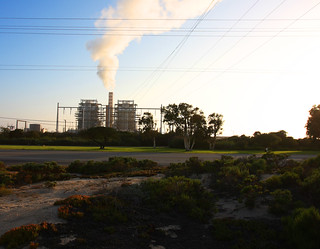Court Upholds Right of EPA to Regulate Greenhouse Gases
 (Flickr/Rennette Stowe)
(Flickr/Rennette Stowe)
These days, good news is hard to come by for climate change advocates. Today, though, happens to be one of those rare days. A federal appeals court upheld the EPA’s authority to regulate greenhouse gases and upheld the EPA’s finding that greenhouse gases are a threat to human health and welfare. The ruling is a big boost for climate change advocates, and more importantly, a big boost for the EPA, which has been under relentless attack from conservatives.
In upholding EPA’s authority, the court cleared the way for EPA to proceed with plans to limit carbon dioxide emission from newly built power plants and other big industrial sources and move forward with new vehicle emission standards. Not surprisingly, industry groups denounced the ruling. The National Association of Manufacturers released a statement that the regulations were, “one of the most, costly, complex and burdensome regulations facing manufacturers,” and vowed to continue the fight the rules with a coalition that includes the American Fuel and Petrochemical Manufacturers, American Petroleum Institute, and the Tennessee Chamber of Commerce and Industry.
This response is typical of most industry anytime there is a regulation at hand. Yet, as we’ve pointed out, the benefits of regulation far outweigh the costs. In fact, a detailed cost-benefit analysis of Clean Air Act regulations from 1990-2020 shows that while the cost of compliance will reach about $65 billion a year by 2020, the economic benefit of the regulations will be almost $2 trillion per year. The decrease in air pollution that resulted from the 1990 Clean Air Act regulations will improve human health, lead to greater worker productivity, and save on medical expenses for air pollution-related health problems.
I’m pretty sure industry protested as loudly against the 1990 regulations as they are doing now. Yet, they adapted and our health and productivity is improving. The industry’s reluctance to make changes to decrease greenhouse gases, even as the threat of climate change continues to increase, is exactly the reason we need government regulations. If you believe that industry would voluntarily make these changes, you do not understand the fundamental nature of business in our economy.
Decreasing greenhouse gas emissions will be a cost for businesses and the benefits will be seen not necessarily in the same balance sheet, but on a broader, society-wide scale. This dynamic provides no incentive for businesses to incur these costs and take the necessary steps because they won't necessarily see cost savings. Regulation is the only way that we can start to decrease greenhouse gases by the levels we need. And, frankly, we are already at risk of too little, too late.

